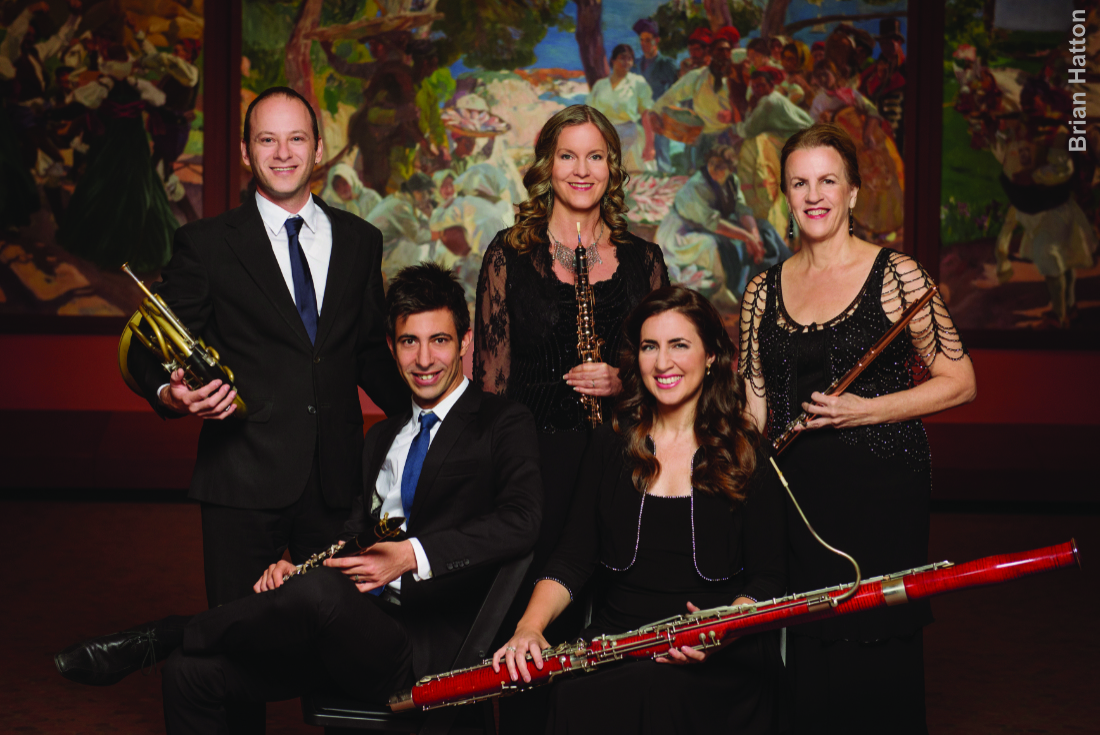Lauded by The New York Times for “…its venturesome programming and stylishness of performance,” Sylvan Winds has presented imaginative and scintillating programs of chamber works for winds under the auspices of Carnegie Hall, Lincoln Center’s Mostly Mozart Festival and the Caramoor International Music Festival.
Performing for us for the first time, Sylvan Winds has earned both critical and audience acclaim for its spirited performances and innovative programming. An integral part of New York City’s cultural offerings, they explore the entire body of work of chamber music for wind instruments.
Jessica Kelly, flute, piccolo
Nuno Antunes, clarinet
Kathy Halvorson, oboe
Gina Cuffari, bassoon
Eric Huckins, horn
Edward MacDowell (1860-1908): To A Wild Rose from Woodland Sketches, Op. 51 (arr. by R. Taylor)
Charles-Édouard Lefebvre (1843-1917): Suite for Wind Quintet, Op. 57
Cannon: Moderato
Allegretto scherzando
Finale: Allegro leggiero
William Grant Still (1895-1978): Summerland (arr. by A. Resnick)
Claude Debussy (1862-1918): Petite Suite (arr. by G. Davies)
En bateau
Menuet
Cortège
Ballet
Intermission
Harry T. Burleigh (1879-1932): From the Southland (arr. by A. Kay)
Through Moanin’ Pines
The Frolic
On Bended Knees
Antonín Dvořák (1895-1978): Quintet in F Major, Op. 96 after the American Quartet
(trans.by G. Barrère/S. Baron)
Allegro ma non troppo
Lento
Molto vivace
Vivace ma non troppo
Edward MacDowell (1860-1908)
Woodland Sketches, Op. 51
Edward MacDowell was an American pianist and composer who grew up in New York City. He studied under several prominent musicians and composers during his youth, including the famous Venezuelan composer Teresa Carreño. MacDowell’s parents sent him to study at the Paris Conservatoire, then he continued his studies at Dr. Hoch’s Conservatory in Frankfurt. There he met Franz Liszt, impressing him with a transcription of one of Liszt’s tone poems.
The first movement of Woodland Sketches, “To a Wild Rose,” is one of MacDowell’s most famous pieces of music, but it almost didn’t see the light of day. He was staying at his log cabin in New Hampshire with his wife, Marian, while he composed Woodland Sketches. Every morning MacDowell would write a few short measures of music at breakfast and toss them into the fire before beginning his real work. One morning he missed the fireplace and his wife picked up the crumpled melody, played it on the keyboard, and implored him to include it in his piece.
Charles-Édouard Lefebvre (1843-1917), arr. by R. Taylor
Suite for Wind Quintet, Op. 57
- Canon: Moderato
- Allegretto scherzando
- Finale: Allegro leggiero
Charles Édouard Lefebvre was born in Paris. After studying law for some time, he changed career paths and studied under Ambroise Thomas and Charles Gounod at the Paris Conservatoire. After his schooling, Lefebvre won the Prix de Rome with Henri Maréchal for the cantata Le Jugement de Dieu. The stipend from this prize allowed him to live and work in Italy for several years. He eventually went on to teach the chamber music course at the Conservatoire.
The Suite for Wind Quintet was commissioned by the Societé de Musqiue de Chambre pour Instruments a Vent in 1884. This piece helped win Lefebvre the Prix Chartier that same year. The music is light and upbeat, featuring soloistic music for each member of the quintet. The canon in the first movement demonstrates the composer’s mastery of counterpoint. The subtle changes in color between each instrument help shade the web of melodies that progress throughout each movement.
William Grant Still (1895-1978), arr. by A. Resnick
Summerland
William Grant Still, Jr., was an American composer who wrote over 200 works, including five symphonies, four ballets, nine operas, and over thirty choral works. He also arranged music for film and even composed music for the 1939 World’s Fair in New York City. The piece, Song of a City, played continuously at one of the exhibitions. His orchestral works have been performed by major orchestras including the Berlin Philharmonic, the London Symphony Orchestra, the Tokyo Philharmonic Orchestra, and the BBC Orchestra. His piano works have become commonplace for performers of 20th century music.
Summerland is the second of three movements from Three Visions, a solo piano piece. Still originally composed the piece for his wife, Verna Arvey. The piece is meant to represent the human soul’s journey after death. If one is judged to have lived a good life, they may enter heaven or Summerland. Still eventually arranged this movement for solo violin and chamber orchestra. The music is gentle, relaxed, and full of luscious tonal harmonies.
Claude Debussy (1862-1918)
Petite Suite, L 65
- En bateau
- Menuet
- Cortège
Debussy is one of the most recognized composers of late-19th and early 20th century French art music. His music pushed the boundaries of accepted harmonic practices up until that point, and his keen ear for orchestration has solidified his reputation as a master composer. Though Debussy is known for his experimental harmonic languages, his music is also steeped in traditional techniques and formal structures. He was also deeply influenced by the poet Paul Verlaine.
The Petite Suite was originally composed for piano four hands. Several movements from the Petite Suite were inspired by poems from Verlaine’s volume Fêtes galantes. The poems paint a picture of 18th century aristocrats engaged in fanciful and frivolous delights. En bateau evokes a night-time journey by boat during which revelers fantasize about romantic flings. The Menuet is the only movement not directly inspired by Verlaine’s poems, but the courtly dance contributes to the atmosphere of Galant aristocrats. Cortège evokes the whimsical story of a woman led by a liveried monkey and a pageboy up the stairs of her home.
Harry T. Burleigh (1866-1949), arr. by A. Kay
From the Southland
- Through the Moanin’ Pines
- The Frolic
- On Bended Knees
Harry Thacker Burleigh was an American composer and baritone who championed Black America in classical spheres. He auditioned at the age of 26 for the National Conservatory of Music in New York, but initially fell just short of their standards. After encouragement from Frances MacDowell, mother of Edward MacDowell and registrar at the Conservatory, Burleigh was not only accepted but offered a scholarship. To express his gratitude to Mrs. MacDowell, Burleigh often made repairs to and helped clean the Conservatory Hall. He would sing spirituals he learned in his youth and caught the attention of composer Antonín Dvorák, the director of the conservatory. Many of the melodies he taught to Dvorák made their way into the Czech composer’s “American” Quartet.
From the Southland was originally scored for solo piano and contains six movements in total. Through the Moanin’ Pines begins with a simple melody with an elegant harmonic accompaniment. This texture builds into a romantic outburst of lush music before gently coming to rest on the final segment of the original melody. The Frolic begins with a syncopated dancing rhythm that builds in intensity until it very suddenly gives way to a more pensive, gentle section before frolicking once more. On Bended Knee is the penultimate movement in the full set of six. The melody of this movement begins beneath a driving harmonic accompaniment, but is soon interrupted by the spiritual Nobody Knows the Trouble I’ve Seen.
Antonín Dvorák (1841-1904), arr. by Barrère/S. Baron
Quintet in F Major, Op. 96
- Allegro ma no troppo
- Lento
- Molto vivace
- Vivace ma non troppo
Dvorák composed his twelfth string quartet while on vacation from his post as the director of the National Conservatory of Music in New York. He spent this holiday in the town of Spillville, Iowa, which had a sizeable population of Czech immigrants. Dvorák found the quiet atmosphere of this town more conducive to his composition than his home in New York City.
Dvorák had immersed himself in American music, particularly Black and Native American musical traditions, and had just completed his “New World” Symphony. While working at the National Conservatory, Dvorák had spent time learning spirituals from the soon to be internationally recognized baritone and composer Harry Burleigh.
Originally composed as his String Quartet, No. 12 (“American”), the first movement begins with a bright pentatonic melody reminiscent of many American folk tunes, which he synthesizes with Czech and Roma ornamentations. The second movement uses melodic material that evokes both spirituals and ritual music he heard performed by Native American musicians. Following this slow movement is an eccentric scherzo full of bright pulsing rhythms. Dvorák mistakenly believed that the melody for this piece was from a scarlet tanager that he heard in Iowa, but the tanager is a neotropical bird that rarely travels North of Mexico. Fourth and final movement of the quartet was inspired by the “chugging” he heard on the many train rides he took across America.
Sylvan Winds
Hailed by The New York Times for “…its venturesome programming and stylishness of performance,” the Sylvan Winds has appeared under the auspices of Carnegie Hall, Lincoln Center’s Mostly Mozart Festival and the Caramoor International Music Festival. Chosen to perform at the NY Governor’s Arts Awards, the ensemble has presented imaginative and scintillating programs of chamber works for winds in such places as Town Hall, Merkin Concert Hall, the White Mountains, the Cape Cod and Skaneateles Festivals, Rutgers University’s Summerfest, Amherst College, the Chicago Chamber Music Society. and the Sejong Cultural Center in Seoul, Korea. They have recorded for the Koch Classics, CRI/New World, North/South, and Albany record labels, and have enjoyed collaborations with such distinguished artists as Gerard Schwarz, Ransom Wilson, the Guarneri String Quartet, pianist Claude Frank, radio personality Robert Sherman, and actor Louis Zorich.
History
The Sylvan Winds, an integral part of New York City’s cultural offerings, has earned both critical and audience acclaim for its spirited performances and innovative programming. Exploring the entire body of work of chamber music for wind instruments, it is the only group of its kind to present an annual concert series in New York City that was inaugurated at the historic Church of St. Luke in-the-Fields in Greenwich Village. The ensemble celebrated its 40th Anniversary during the 2018–2019 season.
Following a concert sponsored by the Carnegie Hall Corporation in 1982, the Sylvan Winds performed regularly in Weill Recital Hall. That summer also marked the beginning of their affiliation with Lincoln Center’s Mostly Mozart Festival, with the Sylvan Winds presenting outdoor pre-concert wind serenades and Avery Fisher Hall pre-concert programs. They also participated with the festival’s winds in performances of the Mozart Gran Partita (K. 361/370a) and Handel’s original orchestration of the Royal Fireworks music.
Established as one of New York’s most versatile chamber music ensembles, the group has also appeared at Town Hall, Merkin Concert Hall, and Symphony Space, and was chosen to perform at the Governor’s Arts Awards at the Metropolitan Museum. They have also performed at the Cape Cod, Killington, Skaneateles, White Mountains, and Caramoor Summer Music Festivals, have toured major university and chamber music series nationally including Amherst College, the Chicago Chamber Music Society, Rutgers University’s Summerfest, the University of the Pacific, and Kohl Mansion, as well as performing in Korea at the Sejong Cultural Center. The group has been heard on New York City radio stations WQXR and WNYC, WGBH in Boston, Minnesota Public Radio and on National Public Radio’s Performance Today. Koch International Classics released the ensemble’s debut recording of French chamber music for winds.
Noted for a wide range and breadth of repertory in delightful and intriguing programs of standard and contemporary works, they have presented a number of New York, United States and world premieres by Gustav Holst, Gunther Schuller, David Chaitkin, Max Lifchitz, Arthur Weisberg, Robert Dick, Aleksandra Vrebalov, and Elizabeth Brown. Invited to perform as part of the Cutting Edge and Composers Concordance concert series in New York City, their CD, The Sylvan Winds Plays American Composers with works by Bruce Adolphe, George Tsontakis, David Chaitkin, and Alvin Etler, was released on CRI/New World. A more recent recording, Startling Stories, features works by Max Lifchitz, Robert Dick, and Cynthia Folio on the North/South label. The ensemble’s most recent recording, Music of the Gilded Age, was released on Albany Records.
The Sylvan Winds have garnered numerous commissioning, recording, residency, and general support grants from the National Endowment for the Arts, Chamber Music America, the New York State Council on the Arts, the NYC Department of Cultural Affairs, and Meet the Composer, now NewMusicUSA.
Recent initiatives include exploring music from different cultures — notably Sounds of the Americas, Russian Nights, Harlem Mosaic, Scandinavian Winds, and Slavic Soul — as well as a historical series of concerts, From the Library of Georges Barrère.. Many of the works they perform are written for a variety of instrumental groupings and have included collaborations with such illustrious guest artists as conductors Gerard Schwarz and Ransom Wilson, the Guarneri String Quartet, pianist Claude Frank, harpsichordist Kenneth Cooper, harpist Kristi Shade, guitarists Oren Fader and Pedro Da Silva, mezzo-soprano Wendy White, narrator Robert Sherman, actor Louis Zorich, and the American Brass Quintet.




